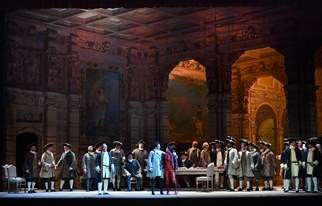|
Back
A Re-created Ball Parma
Teatro Regio
01/12/2019 - & January 16, 17, 18, 19, 20, 2019
Giuseppe Verdi: Un ballo in maschera
Saimir Pirgu*/Otar Jorjikia (Riccardo), Leon Kim*/Sergio Bologna (Renato), Irina Churilova*/Valentina Boi (Amelia), Silvia Beltrami*/Agostina Smimmero (Ulrica), Laura Giordano*/Isabella Lee (Oscar), Fabio Previati (Silvano), Massimiliano Catellani (Samuel), Emanuele Cordaro (Tom), Blagoj Nacoski (Un giudice, Un servo d’Amelia), Corpo di ballo Artemis Danza
Coro del Teatro Regio di Parma, Martino Faggiani (chorus master), Orchestra Filarmonica Italiana, Sebastiano Rolli (conductor)
Marina Bianchi (stage director), Giuseppe Carmignani (sets), Lorena Marin (costumes), Guido Levi (lighting), Michele Cosentino (choreography), Stefano Cattini (video)

(© Roberto Ricci)
A fascinating video was shown during the overture: the reconstruction work painstakingly done by set designer Rinaldo Rinaldi. Using drawings of Teatro Regio’s 1913 production of Un ballo in maschera, Rinaldi was able to bring to life Giuseppe Carmignani’s historic production. An interesting project that was aesthetically appealing and in sharp contrast to the more common “modern” settings that often displease the general public.
The scheduled soprano indisposed, Russian soprano Irina Churilova stepped in as a last-minute replacement. With her beautiful timbre, powerful spinto voice and moving interpretation, she was in a league of her own. Her diction was more than adequate but perhaps her weakest asset. However, there was much to enjoy, as her Act 2 “Ecco l’orrido campo” was both moving and brilliantly sung. The following Riccardo-Amelia duet, “Teco io sto,” usually thrilling, lacked direction as Saimir Pirgu was too apprehensive and Churilova seemed disoriented. Given the lack of rehearsal time, she was understandably ill at ease moving on stage and enjoyed little chemistry with her lead, Saimir Pirgu. Once a leading Mozart tenor, Pirgu moved into the more in-demand Verdi repertoire, but with mixed results. His instrument is not big, hence there’s a tendency to force his voice. With his Mozartian background, he displays elegant phrasing and style – often a rarity among Verdi tenors. Leon Kim was the most problematic cast member. Though his voice is well-suited for the role of Renato, rarely have I seen such stiff acting. To boot, he’s not at ease on stage, whether in his movements or his expressiveness. His tendency to sing forte at all times led to a weak interpretation of “Eri tu che machiavi” and a disequilibrium in the opera’s dynamics: one had little sympathy for the man. Dramatically, the love triangle of Riccardo/Amelia/Renato was broken, and bereft of drama.
On a more positive note, Silvia Beltrami was an excellent Ulrica. Her warm mezzo may not be as impressive as that of contraltos who often take on the role, but she was a convincing interpreter. Unlike many, she did not resort to unnatural chest notes, nor did she display histrionics to portray the soothsayer. Her costume and those of her attendants more resembled natives from Amazonia rather than African slaves in North America, but that’s a small detail than can be blamed on the 1913 historic costumes. Ulrica’s followers were mesmerizing in their serpentine movements. Laura Giordano was miscast as Oscar: her voice is not as fresh as one would have hoped, as the frivolous page. She was unconvincing is this trouser role, as she was utterly unconvincing as a young man; the stage director should have helped correct her feminine walk. Her first act aria, “Volta la terrea” lacked agility, while in the second, “Saper vorresti,” had more charm and was nearly convincing. Rounding out the cast, minor roles were competently sung by Fabio Previati as Silvano, who outshone Emanuele Cordaro as Tom and Massimiliano Catellani as Samuel.
Given that this was a recreation of a 1913 production, it was too conventional for contemporary times. Appealing sets were not sufficient to make this opera come to life. One hopes to see the stage director’s insights inform the work, but not here, alas. Notwithstanding the recreated sets, some fresh ideas could have been explored. Without new insights into the drama, and with an uneven cast, the performance was not compelling. The best offering was the moving and vocally superlative Amelia, as interpreted by Irina Churilova, and the agile conducting of Sebastiano Rolli.
Ossama el Naggar
|